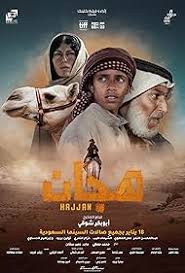
HAJJAN
Saudi Arabia, 2023, 117 minutes, Colour.
Ibrahim Al-Hasawi, Abdulmohsen Alnemr.
Directed by Abu Bakr Shawky.
A film from Saudi Arabia, though filmed on the red Sea coast. For audiences unfamiliar with details of Saudi Arabia, this is a journey into the countryside, the deserts, the towns.
The title refers to camel jockeys. And, camels a prominent in this story. There is an atmospheric opening, the singing of Arabic songs, the role of the camel. The central character is the youngest in a family of camel jockeys.
In many ways, the outline of the plot is familiar but it is the unfamiliar setting which brings it alive. The younger son is bonded with his brother who is injured in a camel race and left by the ruthless camel owners, injured. With this disaster, a decision has to be made about the young man and his camel which he has nurtured after its difficult birth – vividly visualised early in the film.
The young man and his camel of them put under the protector ship of a businessman who is inherited a camel racing from his brother who had despised him as does the widow. He is unscrupulous, self promoting with advertising, gambling on races, trying to separate the young man from his camel, promote his best jockeys with the others conceding races.
This leads to decision-making by the young man, his winning in the races, the support from the angry widow, his taking his camel and taking a jet dangerous journey through the desert, asserting himself and his place in life.
- The title, the camel jockey, the camel races, the range of jockeys, the focus on Matar and his brother?
- The Arab settings, the desert, the communities, homes, stores, supermarkets, the settings for the races, the races themselves? The musical score?
- The song at the opening, at the closing?
- Audience response to camels, in themselves, in the desert, the racing? The initial birth of Hofira? Entrusted to Matar, care for her, riding her? His work as a tailor, mending brother’s coat, his place in the community?
- Saudi Arabia, a male culture, the few appearances of women in this film? The wife and her situation, the arranged marriage, her fortune? Her determination and influence? The young female camel rider, veiled, her age, interactions with Matar, with the wife, helping with Matar’s escape to the desert?
- The community, life, customs, religious police, Muslim prayer? Business, the countryside, the city? Camels, racing? Matar and his brother, his brother’s return, the relationship, his riding in the race, his being pushed from his camel, the tragedy of his death? The impact on Matar?
- The background of the wealthy camel owners, Jesser, inheriting from his brother, despised by his brother, his domination of the trainer, his influence on the announcer, driving his car, the loudspeaker, bribes, praising Jesser? Jesser and his ambitions, ownership, in the significant race, the various preliminary races? The interactions with his wife, domination, her despising him, going behind his back, the influence on Matar, the female rider, winning at the end?
- Matar, the ride, the obstacles and impediments, his winning? Jesser and his reactions, greed, influence, buying the camel and Matar? The discussions within the family, the uncle, going to the city, the deals?
- Matar, with the training, attitude towards the trainer, defiance? The issue of riding Hofira? The role of the support jockeys to let the favoured animals win?
- Matar, his defiance, his successful ride? Jesser and his reaction, with a knife, to destroy the camel, the camel reacting and killing Jesser? Matar, the rescue, the wound, the escape into the desert with the camel? The wife watching him go, the girl supporting him? His future?